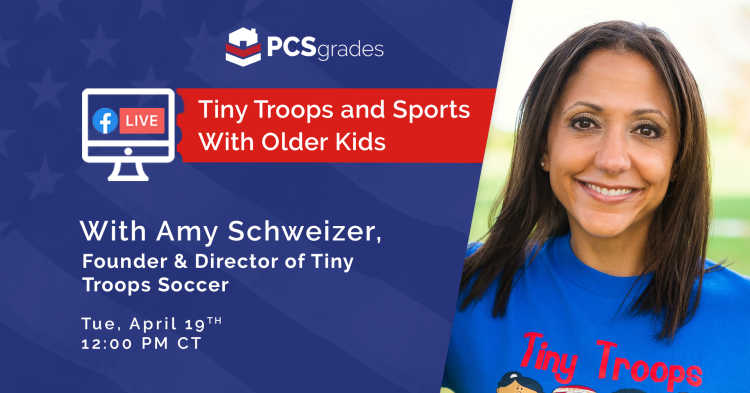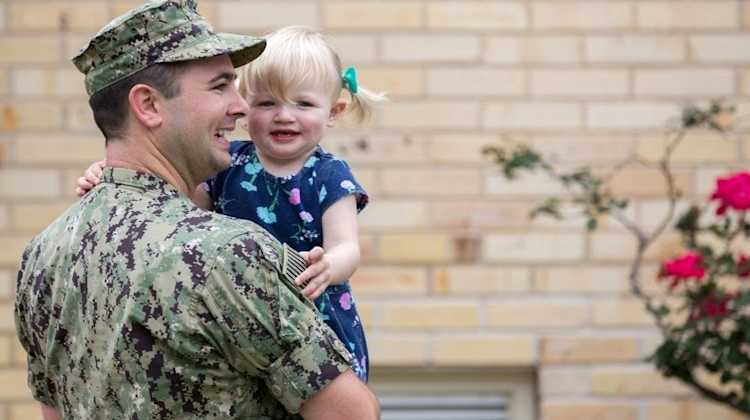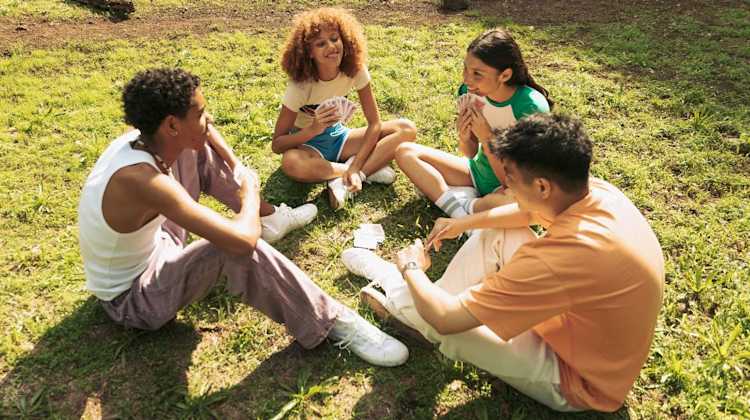Webinar: Sports for Military Kids
by Lizann Lightfoot - April 29th, 2022

Our Guest: Amy Schweizer, Founder and Director of Tiny Troops Soccer
I’m married to an active duty Marine, and I’m mom to three boys, ages 10, 7, and 5 who keep me on my toes! I’m originally from Illinois, and didn’t start playing soccer until age 16. I had played other sports, and they needed girls to play on the new team that was forming. It became the sport I loved the most, and what I was best at. I played through high school and college and in the WSL for a season. Sports have always been a part of my life and my family. When we get together for Christmas, we rent out the Boys and Girls’ Club, and we all change into athletic clothes and play together!
What is Tiny Troops, and what inspired you to create it for military kids?
At Tiny Troops, we are building a global community of active and healthy kids who are equipped to deal with the stressors of military life, and to make some friends along the way. I always wanted to work in the community relations department of a professional team. My Master’s degree is in sports management, and I was working for the Boys and Girls Club at a community fair, where my table was next to the Marine recruiter’s table. And that’s how I met my husband!
A year later, I was in Camp Pendleton, CA with no job. It was a rough transition for me. I had my first child there, and then we moved to Okinawa. My son and I were both going crazy, and I was pregnant with my 2nd, and still wasn’t working. Another spouse was doing soccer lessons, and I was invited to help. I realized my son needed something to do because most sports programs for kids didn’t begin until age 5. The program started to grow, and this sparked my passion for military spouse employment. Soon, my coaches started PCSing, and I realized it was an opportunity to establish sports at other bases. So we are now in 17 states and 3 countries!
Why do you think sports are so important for military children?
It gives you an instant community and a place to belong! It doesn’t matter what else is happening in your life, because you have a common goal and can just have fun. It’s instant friends, and all the other stressors of moving or deployments just melts away.
Plus, moving and getting their heart rate up boosts their physical, mental, and emotional health. We have higher mental health stressors than the rest of the civilian population, so we are building their emotional state.
How can sports help military kids adjust after PCS moves?
It’s something familiar, when everything else is changing--we don’t have the same friends, or school, or house. But soccer is the same. If I know a Tiny Troops kid is moving, we can talk to them about the program or the coaches at the next duty station. The coaches wear the same blue shirts, and it makes an easier transition for a new kid. With Tiny Troops, you aren’t competing against local kids who have grown up together and all know each other.
My oldest son Roman started in Tiny Troops when he was 3, so he has played everywhere we have moved. He remembers his friends and being part of a team, and that’s what sticks with him. Military kids don’t get to grow up on the same team with the same kids for many years, but being part of a team gives them something to remember.
What advice do you have for middle or high school student athletes who PCS?
It’s important to look for those camps that are offered throughout the year because you may have to move during the season, or not have consistent playing. In most cities, you can find rec leagues either through the city programs, the YMCA, or the Boys and Girls Club. Stay involved and active, and look for recreational leagues. Sometimes older kids have to play down to a lower level when they move, which can be a big adjustment. Keep your skills up and keep getting touches on the ball to keep you ready for college. It may be a lot of mindset work to keep them engaged and prepared.
Is there any way to certify continuity in sports between different states when you move?
Unfortunately, no, there aren’t really any programs to certify your level in one state and present that to a coach in another state. But I will say definitely be in close contact with both coaches--the one you are leaving and the one you are going to. Communicate if you are moving after try-outs, mid-season, etc, so they can welcome your child. A good coach is out for the betterment of the child and will want to learn about their strengths and weaknesses.
Tessa: It’s important for parents to be good advocates for their kids. Reach out to coaches before the season begins, and talk to a coach if you are going to miss try-outs, because you may be able to advocate for a private try-out. Or you may qualify for a different level than you were used to.
Is there any state law or legal recourse for military kids who are struggling to place on sports teams after a move?
I couldn’t really find any laws that support this. In many cases, military kids are just getting the short end of the stick. It’s a major concern, but the legal support just isn’t there yet. We have just recently achieved this in recent years with academics, so even though it’s an important topic, sports are lagging behind. And if you’re concerned about missing a season, there really isn’t time to pursue legal action, because that would take too long. So it’s important to communicate with the coaches as much as possible, and try to connect coaches with each other. You can also request that even if a child isn’t allowed to play or compete with the team that they still be allowed to practice with the team. There are so many leagues around now, so you should be able to find some type of team in a drivable distance, even if it isn’t the ideal solution.
If there is a college in your area, a lot of those teams host camps over the summer, so always check those out when moving to a new area--especially if it’s a college you would like to attend!
Do you have any favorite success stories from Tiny Troops?
One of the biggest compliments we get is “Wow, my child really learned how to be in a group setting! They actually listen to you and follow directions!” So we always hear about the social benefits, and of course there are physical benefits too. We are a developmental program, so we focus on skills they will need to enter a traditional league. So we go up to age 5 because kids before that age need directions in a very specific foundational way. We lay the foundation for gross motor skills, listening skills, and of course dribbling skills, because they need to learn to play games together and not fall over when we run first! All our coaches are soccer players, but not everything they do looks like playing a soccer match. We love getting videos and texts from parents who can see that their kids is now succeeding in a traditional league because of the foundation laid in Tiny Troops.
Are there any opportunities for military kids with special needs?
Yes, the Tiny Troops staff and administration has done training with Top Soccer, which is the soccer outreach program for children with special needs, through US Youth Soccer. We tried to host Top Soccer sessions a few years ago, and it didn’t really take off, but ultimately I would love to see that at all our locations. But yes, we welcome all children at all of our sessions, and our coaches are trained in a variety of ways to work with children of different abilities. In some cases, depending on the child’s needs, they may ask for assistance from mom or dad, but that’s something our coaches are happy to discuss.
What is the structure of Tiny Troops, and how can we get involved?
We do month-to-month registration to accommodate military kids schedules. If they are PCSing or going home for a month of leave, you can sign up for whatever months you are available. You can join us anytime throughout the year. This is also because of the age of our kids, because we want kids to ease into it and make sure they are enjoying being outdoors and playing. Registration usually starts on the 15th of the month for the following month. So go to our website--TinyTroopsSoccer.com and click on your region to see programs in your area.
We have 3 sessions per month, which is one per week, and the last one is reserved for makeup work. So each session we work on different games and “drills.” Most of our sessions are off-base, at a local park that is near a military base. We often partner with a local recreation department or school, but always near a military base. We are currently in up to 50 locations, depending on the season and the coaching staff.
Sometimes parents ask how to start Tiny Troops in a new location. Our whole staff has always worked remotely around the world, so we are able to do training and provide equipment and do interviews at almost any location. Many of our coaches are military spouses, but we welcome anyone who loves and supports the military community!
Tell us about your book, “I Will Be Okay: Adventures of a Military Kid.”
I wrote this book, and it was easy to write because it’s about my kid’s life. The premise is--no surprise here--it’s about the importance of getting your kids involved in some sort of physical activity to help their mental, physical, and emotional state, and also to help them pass the time--especially during deployments--and to explore the predictability of sports and how being involved in an activity helps them have something to look forward to and get you out of the house, plus you can make friends! People often tell us that other Tiny Troops families are the first friends they make at a new duty station.
It’s a fun book with pictures of soccer and Tiny Troops, and reminds parents how important it is to keep their child active and involved. It’s available on Amazon, and also from AdventuresofaMilitaryKid.com. That website has some free printables and some fun details about the book that you can check out.
Rapid Fire questions for Amy of Tiny Troops
Who is your favorite soccer player? Mia Hamm because she was the first female soccer player that was thrust into the spotlight, and I will always remember her commercials with Michael Jordan. She represents women empowerment.
What is the toughest lesson you’ve had to learn through sports? It’s the way I communicate with people. I was the Captain of my college team, and another captain pulled me aside and said that the way I talked to people wasn’t working because they weren’t responding. I have learned that it doesn’t matter how I prefer to communicate, but it’s about how my teammates and business colleagues prefer to communicate.
Most memorable Tiny Troops moment? We always do a cheer at the end of each practice, and once as we all gathered together for our huddle, one kid asked, “Is this about me farting?”
What advice would you give a kid overcoming an injury? It’s so hard, but you have to take the time to rest and give it the time to properly heal. Parents, do not let them go back out there or push them to get back on the field. Work with the doctor, because they can injure themselves for life and really limit their future opportunities. My hardest injury was in college, when I went up for a header and another girl’s knee went into my ribs, and I felt a sharp pain. So I went to the doctor to check it out and found out my liver was lacerated. I spent a week in the hospital and was out for the rest of the season. It was so hard to go to the games but not play. But it’s important to do whatever you can to stay in the game, watch plays, or visualize moves to keep mind over matter.
What’s the best PCS advice you can give families? You can buy silicon packages to put in bins and boxes to absorb moisture, to keep down mold and mildew smells.
Is there a virtual at-home kit from Tiny Troops?
Yes! Every Friday, our director of Coaching Annie is live on our page to do an activity, as well as a soccer session. You can set up the iPad outside or in your living room to enjoy those. We do have at-home kits that come with equipment and a games sheet with tons of ideas and activities, and a lot of it can be self-led. It isn’t on our website yet, but if you message us through Facebook or Instagram, we have a link that can be sent via PayPal.
Any advice for students playing on a team that “will never be as good as the locals because we haven’t played together very long”?
That is so hard, and my son says things like that sometimes. All he can do is work on his own skills, challenge himself, and be the best that he can be. Military kids often are at a disadvantage and don’t get that cohesion with a team. But encourage him to be the best player and teammate he can be, whether that means extra practices at home, etc. But you have to look for your own little victories to celebrate when the scoreboard doesn’t reflect that.







